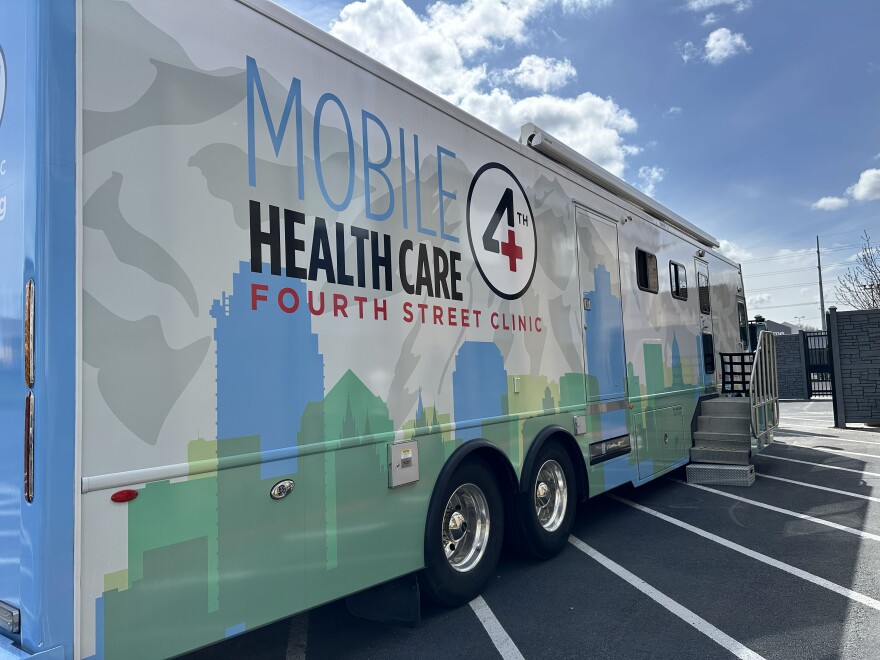Nationwide, more older adults are becoming homeless because they can’t keep up with the cost of living. Chronically unhoused people are also aging. It’s a double whammy for shelters like the Poverello Center in Missoula.
“We are not trained to safely care for folks once they get to a certain point," Poverello Center Director of Programs Lisa Sirois says.
Roughly one in five Montanans seeking shelter or other housing support are age 55 or older, according to state data.
Siriois says seniors with health issues are sometimes asked to leave because staff can’t safely care for them and other guests. A common issue is incontinence. That’s an infection risk for others. But there’s nowhere else for those seniors to go.
“A lot of our communities are like, ‘Well, who’s going to do it,’” Sirios says.
Specialized shelters like the Medically Vulnerable People Shelter (MVP) outside of Salt Lake City are trying to fill that gap.
It’s an old two-story brick hotel remodeled to serve people age 62 and older, or those with severe health problems.

62-year-old Jeff Gregg is playing fetch with his dog Ruffy just beyond the lawn in front of the building.
An old back injury keeps him hunched over even while he throws the ball. It also fueled a decades-long addiction to opioids.
“Fighting that, having a job, insurance, then losing the job, not having insurance, and then I go out to the street and get in that crap and then I'd just be back in the same position,” Gregg says.
Sobriety took a back seat to more immediate needs like finding food and somewhere to sleep.
He says the MVP was the first place where he had time to focus on recovery.
“I was able to get clean. It took me a couple months, but I just kept plucking away.”
The shelter’s dedicated medical case managers helped Gregg get clean. They’re also helping him get surgery for his back. Gregg hopes with less back pain, he can get a job and afford an apartment.

The shelter helps manage health issues that are a barrier to obtaining housing. It’s also designed to be physically accessible for seniors with walkers and wheelchairs. They can often struggle to get in and out of bunk beds at traditional shelters.
Baleigh Dellos manages the MVP shelter for The Road Home, a local nonprofit.
“We move clients into assisted living. We have clients that need memory care, also," that maybe they were living independently before, but they were unable to maintain that and got evicted,” she says.
Primary care doctors and therapists visit weekly. Case managers help residents schedule appointments with specialists.

Matt Haroldsen with the Fourth Street Clinic manages medical services here.
He says the first thing most new residents need help with is medication.
“A lot of our patients on the streets, their medications get jacked from people when they’re in camps and that kind of stuff."
Managing medication for clients stabilizes their health.
"That stabilization alone, especially when it comes to mental health, is a game change,” Haroldsen says.
Nonprofits and local governments are trying to build other shelters like this in Florida, California and Arizona.
Some are funded with private donations. But the Salt Lake shelter gets some state support to meet the needs of the growing senior homeless population.
Ella Smith with the Montana Coalition to Solve Homelessness says shelters here are struggling. Montana has one of the fastest growing unhoused populations nationwide.
“That to me says the state has a role to play," Smith says.
She says opening a specialized shelter for seniors isn’t feasible without ongoing financial support.
The state has given shelters one-time grants for expansions, but lawmakers have shied away from long-term funding.
Montana shelters are finding some creative solutions. The Poverello Center in Missoula is expanding its veterans program. While it’s not targeting seniors specifically, it will help.

“We’re seeing more and more veterans who are maybe closer to that 70s, even 80s range,” Poverello's Sirois says.
The Poverello was able to get funding to renovate an old building.
“Kind of like an apartment building with studio-style apartments and small kitchenettes, individual bathrooms.”
She says they will also be able to get some home health care services for older vets. But there are limits to the care they can provide.
“We’re not a skilled nursing facility. The funding to do that – do it well – just hasn’t been there historically.”
Sirois says the shelter tries to find other options for seniors with complex medical needs. But state programs that provide money for housing are so overburdened, that’s often not an option.
“We kind of end up being stuck,” She says.
That means the most vulnerable homeless seniors are forced to live on the streets, where their health will deteriorate further.






